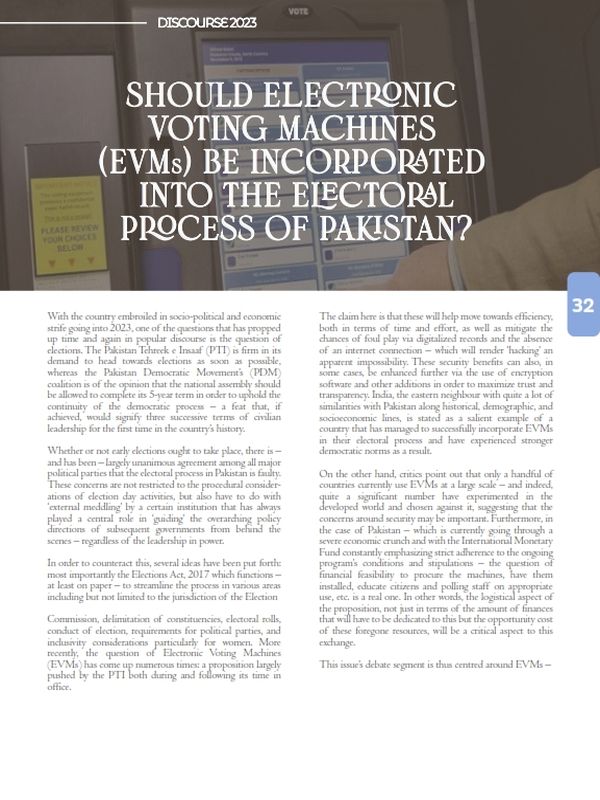Should Electronics voting machines (EVMs) being incorporated into the electoral process of Pakistan
With the country embroiled in socio-political and economic strife going into 2023, one of the questions that has propped up time and again in popular discourse is the question of elections. The Pakistan Tehreek e Insaaf (PTI) is firm in its demand to head towards elections as soon as possible, whereas the Pakistan Democratic Movement’s (PDM) coalition is of the opinion that the national assembly should be allowed to complete its 5-year term in order to uphold the continuity of the democratic process – a feat that, if achieved, would signify three successive terms of civilian leadership for the first time in the country’s history.
Whether or not early elections ought to take place, there is – and has been – largely unanimous agreement among all major political parties that the electoral process in Pakistan is faulty. These concerns are not restricted to the procedural considerations of election day activities, but also have to do with ‘external meddling’ by a certain institution that has always played a central role in ‘guiding’ the overarching policy directions of subsequent governments from behind the scenes – regardless of the leadership in power.
In order to counteract this, several ideas have been put forth: most importantly the Elections Act, 2017 which functions – at least on paper – to streamline the process in various areas including but not limited to the jurisdiction of the Election Commission, delimitation of constituencies, electoral rolls, conduct of election, requirements for political parties, and inclusivity considerations particularly for women. More recently, the question of Electronic Voting Machines (EVMs) has come up numerous times: a proposition largely pushed by the PTI both during and following its time in office.
The claim here is that these will help move towards efficiency, both in terms of time and effort, as well as mitigate the chances of foul play via digitalized records and the absence of an internet connection – which will render ‘hacking’ an apparent impossibility. These security benefits can also, in some cases, be enhanced further via the use of encryption software and other additions in order to maximize trust and transparency. India, the eastern neighbour with quite a lot of similarities with Pakistan along historical, demographic, and socioeconomic lines, is stated as a salient example of a country that has managed to successfully incorporate EVMs in their electoral process and have experienced stronger democratic norms as a result.
On the other hand, critics point out that only a handful of countries currently use EVMs at a large scale – and indeed, quite a significant number have experimented in the developed world and chosen against it, suggesting that the concerns around security may be important. Furthermore, in the case of Pakistan – which is currently going through a severe economic crunch and with the International Monetary Fund constantly emphasizing strict adherence to the ongoing program’s conditions and stipulations – the question of financial feasibility to procure the machines, have them installed, educate citizens and polling staff on appropriate use, etc. is a real one. In other words, the logistical aspect of the proposition, not just in terms of the amount of finances that will have to be dedicated to this but the opportunity cost of these foregone resources, will be a critical aspect to this exchange.
This issue’s debate segment is thus centred around EVMs – in which the attempt has been made to outline the strongest possible argument for and against their incorporation into the electoral process. Both authors for this segment have built significant followings over the years, largely as a result of their critical and hard-hitting analyses on the politics of Pakistan: with Waqas Ahmed taking a generally journalistic approach and Ahmed Bilal Mehboob approaching things from a more academic angle.
The decision to include or exclude EVMs in the upcoming election cycle will have important consequences for the future trajectory of the nation, particularly at this troublesome juncture in its history. As is generally the case with our debate segments, we hope you are able to appreciate both sides of this important exchange and come away with an enhanced understanding of the complexities involved. Happy reading, and remember to keep the Discourse alive!




